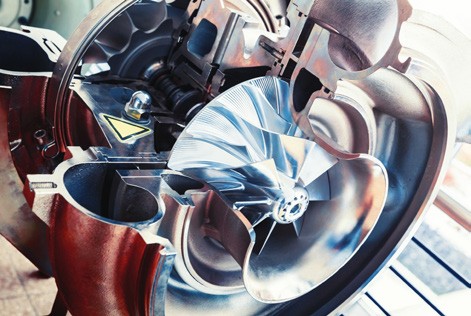Lubrication needs for turbochargers and catalytic converters

Turbocharger structure illustration with cross section.
SOURCE | SHUTTERSTOCK/EVANNOVOSTRO
Q Which oil should we use in turbo-compressed vehicles?
A Turbocharger lubrication is critical for all turbocharged engines (Diesel or petrol) to protect the bearing and shaft. Turbochargers operate at very extreme conditions of high temperature and pressure. The shaft and bearing reach a very high temperature due to the proximity of the exhaust gasses and high revolutions per minute. Oil must lubricate the shaft and bearing continuously; otherwise, the high temperatures and pressure would permanently damage the two components.
The oil must answer very strict criteria to fulfil the turbo compressor’s lubrication and shaft cooling needs. Oil must lubricate the shaft continuously; otherwise, the high temperatures would permanently damage it, and the temperature would then very rapidly reach very high levels.
These conditions mean the oil has to offer considerable detergent properties, an essential resistance to oxidization and deposit formation, but especially very high thermic stability. Synthetic oils are, therefore, the most recommended solution in these conditions. Turbo-compressors are characteristic of diesel engines, as it is very easy for petrol engines to reach the same power level by other means, such as electronic injection, cylinder head multi-valves, etc.
TotalEnergies has two engine oil ranges specifically formulated for turbocharged applications:
RUBIA RANGE: - For all heavy-duty turbocharged diesel engines
QUARTZ RANGE: - For all passenger vehicles (Diesel/Petrol) with Turbo charger.
Q Are all oils adapted to vehicles equipped with a catalytic converter?
A The reply is clear: NO.
The catalytic converter has met this challenge; whose role is to complete exhaust gas combustion just before it escapes into the atmosphere. To respect the environment, oils must offer a high lubrication property, better detergent and dispersant properties, and a low sulphur and phosphorous content. These properties are essential for oils that will be used in vehicles equipped with catalytic converters. The use of a non-adapted oil can damage the catalytic converter. Synthetic lubricants are highly recommended because of the intrinsic properties of their base.
Q Are there engine oils adapted to hybrid vehicles and vehicles fitted with post-treatment systems (catalytic converter/ diesel particle filter-DPFs)?
A YES.
These are engine oils formulated with Low SAPS technology (Low content in Sulphated Ash, Phosphorous and Sulphur) to ensure optimal functioning of Catalytic converters and DPFs, whose role is to complete the combustion of the exhaust gas before they are released into the atmosphere by lowering emissions of NOx, HC, and CO particles.
Also, the oils extend the longevity of post-treatment systems by preventing catalytic converters and DPFs from clogging and filling.
These engine oils are very fluid/low viscosity, which completely reduces friction, delivering full power and generating fuel savings at the same time.
TotalEnergies has two engine oils specifically designed for these applications:
QUARTZ 9000 XTRA FUTURE XT 0W20: - Suited for use with “Downsized” engines equipped with Stop and Start technologies, Hybrid engines and posttreatment systems.
QUARTZ INEO MC3 5W30: - Suited for use with engines fitted with posttreatment systems.
This article is courtesy of TotalEnergies Marketing Kenya.